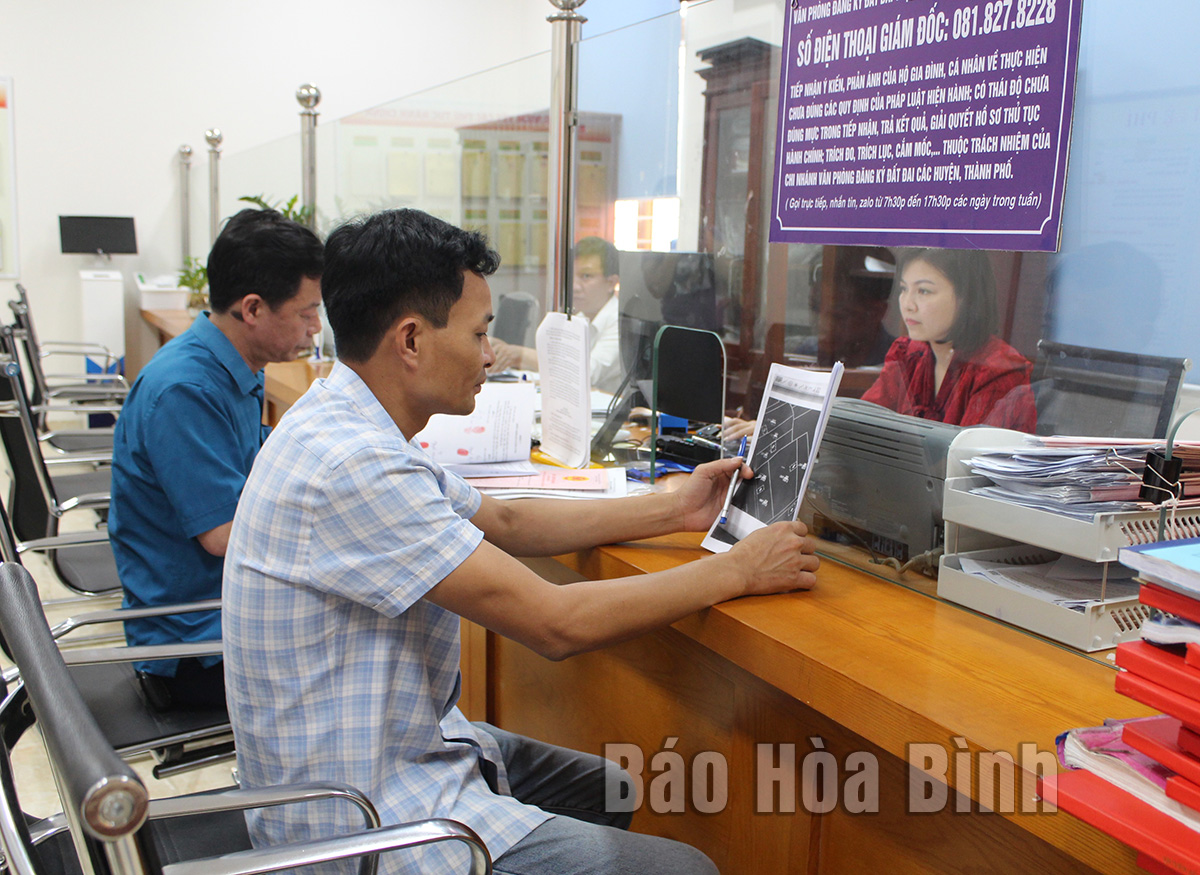
(HBO) - Yen Thuy district has focused on implementing three pillars of digital government development, administrative modernisation and data development as part of efforts to boost the development of digital government, digital economy, and digital society.
To meet the demand of human resources serving digital transformation, the People’s Committee of Yen Thuy district has created conditions for public servants to join training courses on digital skill.
All officials and public servants at district and commune levels have regularly used computers in their work; while 80% of the total public servants have been trained in applying information technology in digital transformation.
Staff in charge of receiving documents and returning results in the People’s Committee of Yen Thuy district are handling administrative procedures.
As many as 185 online public administrative services are being implemented in the district. The locality has deployed shared software systems of the province, effectively applying electronic one-stop-shop software in processing administrative procedures to serve the demand of people and businesses.
All the public services have been provided on the portal of the district and communes. The access to and usage of online public administration services increased from 2.7% in 2020 to 98.9% in 2022. By the end of the first quarter of 2023, the rate reached 99.1%, while the usage of online payment stood at 33.5%.
To ensure the criteria for building and developing an e-government, towards building a digital government and digital transformation, the People's Committee of Yen Thuy district digitised the results of administrative handling and implemented paperless meeting; set up community digital technology teams; and develop an online meeting system in the district, communes and towns. These initiatives have helped improve efficiency, save costs, and reduce travel time.
The district has deployed a dedicated data transmission network system from the district level to the commune level. Twelve district- and commune-level portals have been maintained and operated smoothly, meeting the requirements for disseminating the Party's policies and the State’s laws.
The locality has also strictly and timely implemented the directive documents of the Government and the provincial authority on the development of data for the operation and management of agencies, units, the People's Committees of communes and townships.
Vice Chairman of the People’s Committee of Yen Thuy district Bui Van Hong said the investment for developing information technology, and equipment serving digital transformation in the locality has not yet met the requirements.
The habit of using printed documents, and limited qualifications and conditions for operating information technology equipment have caused difficulties, and hindered access to online public services, he added.
To further accelerate digital transformation, the district has taken a series of measures such as developing applications on mobile devices that allow implementing of public administrative procedures; concretising regulations and guidelines on the implementation of digital transformation; and issuing regulations and policies to support local enterprises in promoting the scheme./.
Hoa Binh province is undergoing a dynamic transformation amid Vietnam’s national digital transition. Building on Poliburo’s Resolution No. 57-NQ/TW on breakthroughs in science, technology, innovation, and national digital transformation, the province has rolled out a wide range of practical action plans. A standout initiative is the "Digital Literacy for All” movement, an effort to ensure that no one is left behind in the digital era.
Hoa Binh province is undergoing a dynamic transformation in the wake of the national digital transformation movement. Building on Resolution No. 57-NQ/TW of the Politburo on breakthroughs in science, technology, innovation, and national digital transformation, the province has implemented a wide range of practical action plans. A standout initiative is the "Digital Literacy for All” movement ambitious effort to ensure that no one is left behind in the digital age.
With a spirit of unity and proactive problem-solving, the Party Committee, the government and the people of Dong Lai Commune (Tan Lac District) have made great strides in implementing the resolutions of the 24th Party Congress of the commune for the 2020 - 2025 term. Focusing on leadership and practical actions, the commune has brought the Party’s resolutions into daily life, creating strong impacts and pushing the local development forward.
Amid the nationwide push for digital transformation, young people in Hoa Binh Province are stepping up as dynamic pioneers, applying technology to enhance Youth Union operations and expand the reach of youth-led initiatives. Through creativity and adaptability, Youth Union organizations at all levels have introduced a series of practical solutions, contributing to modern governance and community development.
In recent years, An Nghia commune, located in Lac Son district, has stepped up administrative reform, focusing on improving the quality and efficiency of its single-window service unit for receiving and processing administrative procedures. These improvements have helped create favourable conditions for local residents and organisations to handle administrative procedures, contributing to the commune’s broader socio-economic development.
The Prime Minister-approved master plan to develop the multi-use value of forests ecosystems through 2030, with a vision to 2050, aims to improve the management and sustainable use of forest resources, create jobs, increase incomes, and improve the living standards of ethnic minorities, people in mountainous and remote areas, forest workers and those living near forests.



